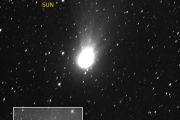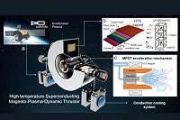
Copernical Team
Space HPC offers new super-computing possibilities

The European Space Agency has unveiled the ESA Space HPC, a new resource for space in Europe. ESA Director General Josef Aschbacher was joined by ESA Council Chair Renato Krpoun and ASI president Teodoro Valente to cut the ribbon at ESA’s establishment in Italy, ESRIN.
The Incredible Adventures of the Hera mission – The cosmic roadtrip
 Video:
00:03:21
Video:
00:03:21
Meet Hera, our very own asteroid detective. Together with two CubeSats – Milani the rock decoder and Juventas the radar visionary – Hera is off on an adventure to explore Didymos, a double asteroid system that is typical of the thousands that pose an impact risk to planet Earth.
In September 2022 NASA’s DART spacecraft tested if it was possible to divert an asteroid by giving it a shove – and found out that it was! Important knowledge, should we wish to avoid going the same way as the dinosaurs. Astronomers can observe from afar how the smaller
Three MetOp-SG-B weather siblings
 Image:
Three MetOp-SG-B weather siblings
Image:
Three MetOp-SG-B weather siblings Sidus Space Marks One Year in Orbit for LizzieSat-1 and Advances Space Innovation
 Sidus Space (NASDAQ: SIDU) proudly commemorates the one-year orbital milestone of LizzieSat-1 (LS-1), highlighting a full year of operational success and technological innovation. Over the past 365 days, LS-1 has showcased its capabilities, generating revenue through advanced software applications while reinforcing Sidus' leadership in space technology.
As the first hybrid 3D-printed satel
Sidus Space (NASDAQ: SIDU) proudly commemorates the one-year orbital milestone of LizzieSat-1 (LS-1), highlighting a full year of operational success and technological innovation. Over the past 365 days, LS-1 has showcased its capabilities, generating revenue through advanced software applications while reinforcing Sidus' leadership in space technology.
As the first hybrid 3D-printed satel BlackSky Achieves Landmark Milestone with Gen-3 Very High-Resolution Imagery Just Days After Launch
 BlackSky Technology Inc. (NYSE: BKSY) has successfully delivered the first very high-resolution images from its newly launched Gen-3 satellite just five days after its deployment on February 18.
"Initial Gen-3 image quality is exceeding customer expectations with minimal calibration. Our first Gen-3 satellite is delivering remarkable initial image clarity at insertion altitude, and we expe
BlackSky Technology Inc. (NYSE: BKSY) has successfully delivered the first very high-resolution images from its newly launched Gen-3 satellite just five days after its deployment on February 18.
"Initial Gen-3 image quality is exceeding customer expectations with minimal calibration. Our first Gen-3 satellite is delivering remarkable initial image clarity at insertion altitude, and we expe Scottish space tech to power Danish financial innovation
 Scottish space technology is playing a key role in advancing Denmark's financial sector, leveraging satellite data to enhance ESG reporting, bolster cybersecurity, and refine investment decision-making. This collaboration aligns with Denmark's recently unveiled national space strategy, announced in December 2024, which prioritizes international partnerships to drive innovation.
Scottish En
Scottish space technology is playing a key role in advancing Denmark's financial sector, leveraging satellite data to enhance ESG reporting, bolster cybersecurity, and refine investment decision-making. This collaboration aligns with Denmark's recently unveiled national space strategy, announced in December 2024, which prioritizes international partnerships to drive innovation.
Scottish En GCT Semiconductor and Globalstar Collaborate on IoT Modules for Satellite and Cellular Networks
 GCT Semiconductor Holding Inc. ("GCT") (NYSE: GCTS), a leading provider of 4G and 5G semiconductor solutions, has announced a strategic collaboration with Globalstar, Inc. (Nasdaq: GSAT), a prominent satellite and mobile communications company, to develop advanced two-way satellite messaging systems for Globalstar's mobile devices and modules. This partnership will incorporate GCT's IoT chipset,
GCT Semiconductor Holding Inc. ("GCT") (NYSE: GCTS), a leading provider of 4G and 5G semiconductor solutions, has announced a strategic collaboration with Globalstar, Inc. (Nasdaq: GSAT), a prominent satellite and mobile communications company, to develop advanced two-way satellite messaging systems for Globalstar's mobile devices and modules. This partnership will incorporate GCT's IoT chipset, First Aries Satellite Completes One Year in Orbit
 Apex's Aries Serial Number One (SN1) spacecraft has successfully completed its first year in orbit, marking a significant achievement for the company and the broader space industry. As a leader in high-rate configurable satellite bus manufacturing, Apex has established itself as a dependable supplier for the space industrial sector.
Aries SN1 stands out as the fastest spacecraft to transit
Apex's Aries Serial Number One (SN1) spacecraft has successfully completed its first year in orbit, marking a significant achievement for the company and the broader space industry. As a leader in high-rate configurable satellite bus manufacturing, Apex has established itself as a dependable supplier for the space industrial sector.
Aries SN1 stands out as the fastest spacecraft to transit Striking images capture the story of space weather
 A striking new exhibition in London showcases the ongoing efforts to protect Earth from the disruptive effects of solar activity. Created by photographer and storyteller Max Alexander, the collection highlights the instruments set to fly aboard ESA's Vigil mission, which is expected to revolutionize Europe's ability to predict space weather following its planned launch in 2031.
Despite bei
A striking new exhibition in London showcases the ongoing efforts to protect Earth from the disruptive effects of solar activity. Created by photographer and storyteller Max Alexander, the collection highlights the instruments set to fly aboard ESA's Vigil mission, which is expected to revolutionize Europe's ability to predict space weather following its planned launch in 2031.
Despite bei Astronomer finds gas giant exoplanets formed earlier than previously thought
 A fresh look at past data reveals that exoplanets with masses similar to Jupiter formed much sooner than previously thought, according to new research.
The Ohio State University study's results provide new information about the timing of accretion - the process of accumulating a large amount of gas as well as solid particles that are rich in carbon and oxygen to make large planets, like Ju
A fresh look at past data reveals that exoplanets with masses similar to Jupiter formed much sooner than previously thought, according to new research.
The Ohio State University study's results provide new information about the timing of accretion - the process of accumulating a large amount of gas as well as solid particles that are rich in carbon and oxygen to make large planets, like Ju 






























